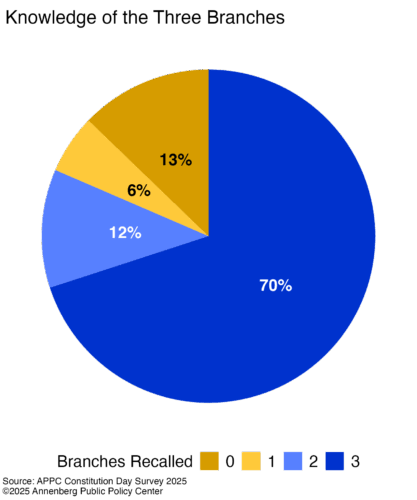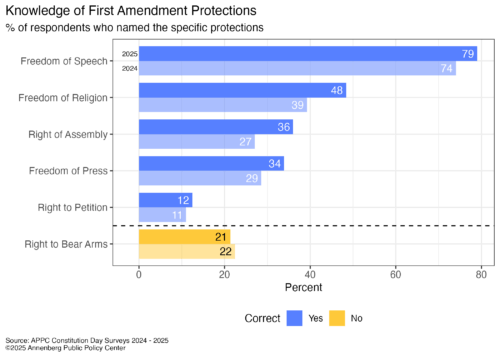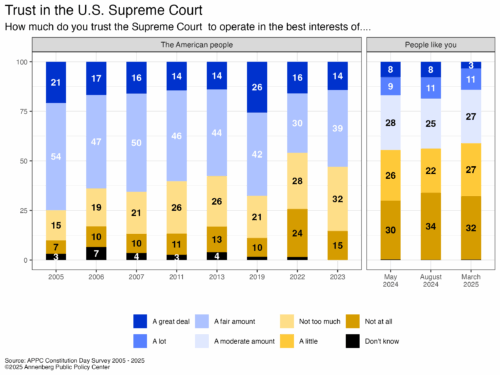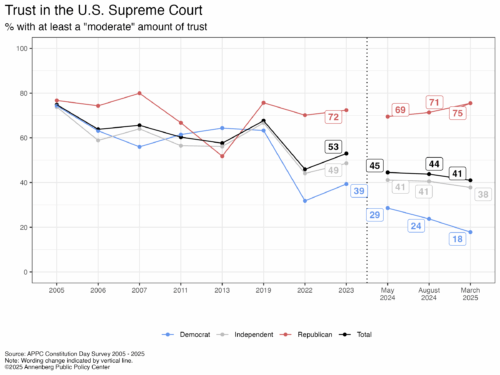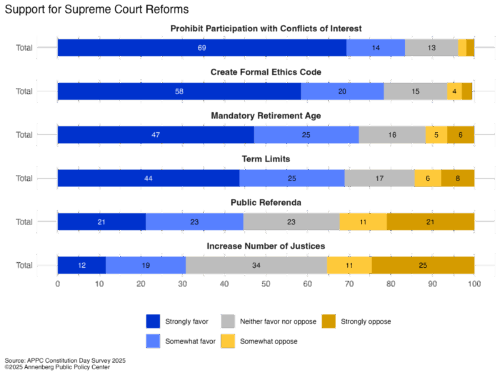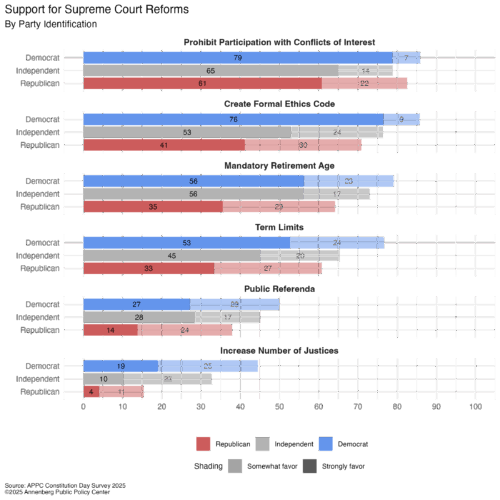Americans are more knowledgeable this year in answering basic civics questions, according to the Annenberg Constitution Day Civics Survey, conducted annually by the Annenberg Public Policy Center (APPC) of the University of Pennsylvania.
More than two-thirds of U.S. adults (70%) were able to name all three branches of government, the executive (the president), judicial (the courts), and legislative (Congress), significantly more than a year ago (65%).
When asked which specific rights are guaranteed by the First Amendment, the survey finds that nearly 4 in 5 people (79%) can name “freedom of speech,” a statistically significant increase over the 74% who cited it in 2024.
“People can’t cherish, safeguard, or exercise their constitutionally protected rights unless they know that they have them and understand how effective use of them sustains our system of government,” said Kathleen Hall Jamieson, director of the Annenberg Public Policy Center. “Civics education at home and in schools should be a high priority as a result.”
Released in advance of Constitution Day (Sept. 17th), the nationally representative survey also finds that trust in the U.S. Supreme Court continues to deteriorate, with nearly 6 in 10 people (59%) voicing little or no trust that the nation’s highest court is operating in their best interests. The survey finds popular support across party lines for several potential proposals to reform the Supreme Court, including a prohibition on the justices participating in cases in which they have conflicts of interest; creation of a formal ethics code; establishment of a mandatory retirement age; and term limits.
Highlights
The 2025 edition of the Annenberg Constitution Day Civics Survey, released annually to celebrate Constitution Day, finds that:
- Over two-thirds of Americans (70%) can name all three branches of government, up from 65% in 2024.
- Asked what specific rights are guaranteed by the First Amendment, nearly 4 in 5 (79%) respondents say freedom of speech. Less than half of Americans mention each of the other four rights: the next most-often cited, freedom of religion, is named by 48%.
- Four in 10 of U.S. adults (41%) have at least a moderate amount of trust that the Supreme Court is operating in their best interests – down significantly from 44%, when the question was asked 10 months earlier.
- There is a remarkable, nearly 60-point gap between the two major parties on trust in the Supreme Court – 75% of Republicans have at least a moderate amount of trust, but only 18% of Democrats and 38% of independents do.
- There’s strong bipartisan support for several reforms to the Supreme Court, with over 80% favoring prohibiting justices from participating in cases in which they have “personal or financial interests.”
Annenberg Constitution Day Civics Survey
The Annenberg Constitution Day Civics Survey is a nationally representative survey conducted in advance of Constitution Day by the Annenberg Public Policy Center (APPC) of the University of Pennsylvania.
This 2025 edition of the Constitution Day survey, which is conducted for APPC by SSRS, an independent research company, draws on responses to Annenberg surveys of empaneled, nationally representative samples of U.S. adults conducted during three distinct survey periods in 2025. In March, respondents (n=1,363) were asked about attitudes toward the Supreme Court. In May-July, the same panel of respondents (n=1,334) was asked about proposed reforms to the Supreme Court. In August, a different nationally representative panel of U.S. adults (n=1,684) was asked about civics knowledge, namely, the branches of government and First Amendment. All have a margin of sampling error of ± 3.5 percentage points at the 95% confidence level.
For further details about the survey samples, dates, question wording, and methodology, see the topline.
The three branches of government and First Amendment
The three branches: More than two-thirds of Americans (70%) can name all three branches of government, the highest in a few years. (The question has been asked since 2007 and annually since 2014, but a shift in survey methodology from phone to internet in 2023 means the recent figures are not directly comparable to the older ones.) In addition, 12% can name two branches, 6% can name one, and 13% cannot name any, no significant change from last year.
The First Amendment: This year’s survey shows an upsurge in public awareness of most of the five rights guaranteed under the First Amendment. In our August survey, when respondents are asked if they are able to name the specific rights guaranteed by the First Amendment:
- Nearly 4 out of 5 (79%) say freedom of speech, up significantly from 74% in 2024;
- Nearly half (48%) say freedom of religion, up 9 percentage points from 2024;
- Over a third (36%) say right of assembly, up from 27% in 2024;
- Over a third (34%) say freedom of the press, which is not statistically different from last year – but this right fell to fourth place from third place in the public’s recollection;
- And 12% say the right to petition, about the same as last year.
Four in 10 respondents (40%) can name a majority of rights (three or more), up sharply from 30% in 2024. Nearly 9% of respondents can name all five First Amendment rights, while 32% can name three or four (up from 23%) and 42% can name one or two. About 1 in 5 people (18%) cannot name any, about the same as last year.
Although 12% correctly say the right to petition the government, nearly twice as many (21%) incorrectly say the First Amendment protects the right to bear arms, a right under the Second Amendment. This is statistically about the same as 2024.
The 2025 increases in knowledge of the branches and the First Amendment, during the first year of the second Trump administration, parallel a 2018 increase during the first Trump administration. In both cases, a torrent of executive actions and the resulting judicial cases and actions by Congress produced a seemingly nonstop rush of political news. (In 2018, however, just 32% of the public could name all three branches.)
Political party affiliation did not appear to play a role in this increase in civics knowledge. There was no significant difference in the number of branches or First Amendment rights recalled by respondents based on party affiliation – self-described Republicans and Republican-leaning independents knew about the same number as self-described Democrats and Democratic-leaning independents. But people in both of those two party-affiliated groups were more knowledgeable than independents who said they did not lean toward either party.
Eroding trust in the Supreme Court, widening party gap
In the past few years, a number of surveys have shown declining trust and confidence in the U.S. Supreme Court and a widening gap between the political parties in views on the court. The Annenberg Public Policy Center’s Constitution Day Civics Survey found that from 2019 to March 2025, the percentage of U.S. adults holding at least a moderate amount of trust in the court dropped 27 percentage points, from 68% to 41%. Other surveys have mirrored that trend to differing degrees – Gallup found approval of the court falling from 54% in 2019 to 39% in 2025.
A paper last year by APPC researchers in the journal Science Advances, based on APPC surveys, found that since the court’s June 2022 Dobbs decision – which overturned the half-century-old Roe v. Wade ruling establishing a constitutional right to abortion – public views of the court have strongly reflected political polarization, a dramatic change from the past.
“Trust has fallen sharply and become polarized,” said University of Pennsylvania political science professor Matt Levendusky, who directs the policy center’s Institutions of Democracy division. “Even after previous controversial decisions, like Bush v. Gore, trust in the court rebounded. But in the years since Dobbs, it has continued to erode.”
This year’s survey finds that just 3% of Americans have a great deal of trust in the court to operate in their best interest, down from 26% in 2019, while almost a third (32%) have no trust (“not at all”) the court is operating in their best interest – double the number since 2023.
The survey finds a widening and extraordinary 58-point gap between the parties on trust in the Supreme Court. As of March 2025, three-quarters (75%) of Republicans and Republican-leaning respondents have at least a moderate amount of trust in the court, up from 69% in May 2024, while just 18% of Democrats and Democratic-leaning respondents have a moderate amount of trust, down from 29% in May 2024.
“Not only has trust fallen but it has also become sharply polarized by party,” Levendusky said. “The court was once held in high esteem by Democrats and Republicans alike, but that is no longer the case. If the court is just another political actor, then it loses its special place in our political system, with worrying long-term implications.”
Broad popular support for some Supreme Court reforms
With the changing political environment as a backdrop, the 2025 civics survey asked respondents for their views on measures that have been discussed to reform the Supreme Court. The survey found most Americans favor four of six proposals:
- Prohibiting participation of justices with conflicts: 83% favor prohibiting Supreme Court justices from participating in cases in which they have personal or financial interests.
- Formal ethics code: 78% favor creating a formal ethics code for Supreme Court justices that allows for justices to be investigated if they are accused of an ethical violation.
- Mandatory retirement age: 72% favor requiring justices to retire by a certain age.
- Term limits: 69% favor setting a specific number of years that justices serve instead of granting them lifetime appointments.
- Public referenda: 44% favor allowing the public to vote to overturn Supreme Court decisions on controversial issues.
- Increasing the size of the court: 31% favor increasing the number of justices on the current nine-member Supreme Court.
How partisanship affects views of court reform
Bipartisan majorities favor four potential reforms to the Supreme Court, though there are partisan differences in the extent to which they favor them. The top potential reform supported by members of both parties is prohibiting justices from participating in cases in which they have personal or financial interests, backed by 86% of Democrats and 83% of Republicans. Notably, most survey respondents in both parties do not favor increasing the number of justices on the Supreme Court, an idea proposed by some Democrats and backed by 44% of Democrats, 15% of Republicans, and 33% of independents. One proposal – allowing the public to vote to overturn Supreme Court decisions on controversial issues – is supported by half of Democrats (50%), but just 38% of Republicans and 45% of independents.
Constitution Day
APPC releases its annual Annenberg Constitution Day Civics Survey in advance of Constitution Day, which celebrates the signing of the Constitution on Sept. 17, 1787. APPC’s initiatives to enhance civics education include Annenberg Classroom, which offers free resources for teaching the Constitution, and the Civics Renewal Network (CRN), a coalition of 46 nonpartisan, nonprofit organizations dedicated to improving civics education by providing free, high-quality resources for teachers. Recently added educational resources for teachers include the collaborative Constitution Day Hub website and a new film, “Balancing State and Federal Power: The Constitution’s Commerce Clause,” in Annenberg Classroom’s series of award-winning videos.
“Strengthening the citizenry’s knowledge of the U.S. Constitution remains paramount for the long-term health of the nation’s democracy. This year’s APPC Constitution Day Civics Survey points to some clear knowledge gains, but there is also evidence indicating that there is more work to be done,” said R. Lance Holbert, director of the center’s Leonore Annenberg Institute for Civics (LAIC), the home of Annenberg Classroom and facilitator of CRN. “Civics education needs to be a life-long pursuit. The education materials provided through Annenberg Classroom, our Civics Renewal Network partners, and the recently created Constitution Day Hub aid in building up the nation’s civics knowledge reserves.”
The Annenberg Public Policy Center’s (APPC) Annenberg Constitution Day Civics survey was developed under the leadership of Matt Levendusky, director of APPC’s Institutions of Democracy division; research analyst Shawn Patterson Jr.; APPC’s managing director of survey research, Ken Winneg; R. Lance Holbert, director of the Leonore Annenberg Institute for Civics; and APPC director Kathleen Hall Jamieson.
The Annenberg Public Policy Center was established in 1993 to educate the public and policy makers about communication’s role in advancing public understanding of political, science, and health issues at the local, state, and federal levels.
